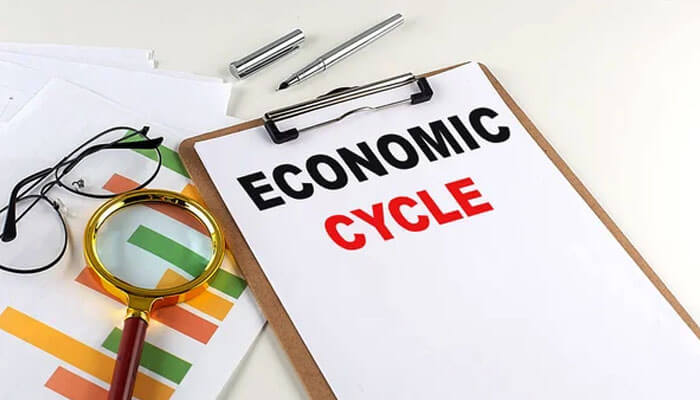Economic cycles can feel like riding a rollercoaster without a seatbelt—full of unexpected twists and turns. Understanding these cycles isn’t just for economists; it’s essential for anyone looking to secure long-term growth. From boom to bust, knowing how to read the signs can make all the difference. So, are you prepared to navigate these ups and downs with confidence? Trader AI connects you with experts who illuminate the pathways through economic cycles, enhancing your trading acumen.
Historical Patterns: What Past Economic Cycles Teach Us About Future Growth
The Great Depression: A Tale of Overconfidence and Collapse
Ever heard of the Great Depression? It wasn’t just a bad day at the office—it was a worldwide economic meltdown. In the 1920s, things were looking up, and people were spending money like there was no tomorrow. However, this overconfidence led to a market crash in 1929 that spiraled into the Great Depression. Jobs were lost, banks failed, and economies worldwide were left picking up the pieces.
The Dot-Com Bubble: When Hype Trumps Reality
Remember the late ’90s? Everyone was buzzing about the internet, and stocks in tech companies skyrocketed. Investors poured money into anything ending with “.com” without checking if these companies were actually profitable. Then, in 2000, the bubble burst, and trillions of dollars vanished almost overnight. What can we learn? Hype and speculation don’t replace sound financial planning. Look for real value, not just what’s trending.
The 2008 Financial Crisis: A Lesson in Over-Leverage
Fast forward to 2008, and we’re looking at another crash, this time driven by risky mortgage lending. When people and banks borrowed more than they could afford, the house of cards collapsed. A recession followed, impacting millions globally. So, what’s the lesson? Watch out for easy credit and too-good-to-be-true investment opportunities. Sometimes, sticking to basics like manageable debt and stable assets can save the day.
Economic Indicators: Deciphering the Signals of Boom and Bust Phases
Unemployment Rates: The Canary in the Coal Mine
Think of unemployment rates as a barometer for economic health. When people have jobs, they spend more, boosting the economy. But when unemployment rises, consumer spending drops, businesses suffer, and a recession might be on the horizon. Keep an eye on job reports and understand that rising unemployment can be a warning sign of tougher times ahead.
Consumer Confidence: The Mood of the Market
Consumer confidence reflects how optimistic or pessimistic people feel about their economic future. If consumers believe times are good, they’re more likely to spend money on everything from homes to holidays. But when confidence plummets, people tighten their belts, often leading to reduced economic growth. It’s like when you sense a friend is feeling down; you might be cautious about inviting them out. Similarly, when consumer confidence drops, it might be wise to rethink big investments.
Interest Rates: The Cost of Borrowing
Interest rates set by central banks can make borrowing money cheaper or more expensive. Low rates usually encourage borrowing and investing, potentially leading to economic growth. However, if rates are too low for too long, they could lead to asset bubbles (think housing or stock market). On the flip side, high rates can cool an overheated economy but might stifle growth.
Inflation Rates: The Silent Erosion of Buying Power
Inflation isn’t just a boring term you hear on the news; it directly affects how far your money goes. When inflation rises, every dollar buys less than it used to. A steady, low inflation rate is generally good, signaling a stable economy. But when inflation spikes, it might mean the economy is overheating, or there could be supply issues, which often lead to central banks raising interest rates to cool things down.
Strategic Positioning During Expansion: Maximizing Opportunities in Booming Markets
Diversify Investments: Don’t Put All Your Eggs in One Basket
It’s tempting to ride the wave when markets are booming, but putting all your money in one place can be risky. Diversifying—spreading investments across stocks, bonds, real estate, and other assets—can help protect against unexpected downturns. Think of it like trying different dishes at a buffet: if one doesn’t sit well, the others might still fill you up.
Focus on Innovation and Efficiency: Keep the Ball Rolling
During periods of economic expansion, businesses often have more resources to invest in innovation. Use this time to improve your processes, products, or services. Maybe it’s time to adopt new technology or refine your supply chain. By focusing on efficiency and innovation, you’re not just riding the wave; you’re building a better surfboard.
Build Reserves: Save for a Rainy Day
Boom times won’t last forever. As the saying goes, “Make hay while the sun shines.” During periods of growth, set aside reserves for when the inevitable downturn arrives. This could mean saving profits, reducing debts, or even investing in recession-proof assets.
Stay Alert: Keep a Finger on the Pulse
While it’s easy to get complacent during boom times, staying vigilant is crucial. Monitor economic indicators and be ready to pivot if necessary. Regularly review your portfolio and be prepared to make adjustments. Imagine you’re at a party—having a good time, but always aware of your surroundings. It’s about being proactive, not reactive. And if you’re ever in doubt, don’t hesitate to seek advice from a financial expert.
Conclusion
Riding the waves of economic cycles doesn’t have to be a daunting task. By learning from past patterns, keeping an eye on key indicators, and strategically positioning during expansions, we can turn economic uncertainties into opportunities. Remember, the goal isn’t just to survive these cycles but to thrive through them. So, are you ready to make the most of the next economic shift?



